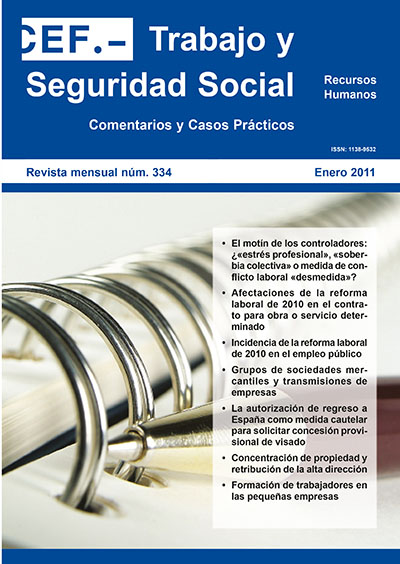Small enterprise and personnel training in Spain
DOI:
https://doi.org/10.51302/rtss.2011.5219Keywords:
small business, personnel training, business investment in training, employe satisfaction with company training, lifelong learning in EuropeAbstract
Small businesses account for 85 per 100 of Spanish business. They constitute the majority firm size in any European economy, being considered by the European Union (UE) as a catalyst for innovative business ideas, entrepreneurship, and learning and overcoming initial obstacles and failures, in the way of good management and success in business. For this purpose, the Union urges to the Member States to the need to encourage and facilitate the continuing training of small entrepreneurs, themselves as of their companies’ personnel, for continuous adaptation to the skills required by the market.
The central role that the EU has recognized to lifelong learning as an active employment policy («European Employment Strategy») has been completed with a process of periodic evaluation of the training situation in companies –also in small enterprises– through surveys that allow access to statistical data, not only useful for a comparative view between their countries members, but to analyze the evolution of the indicators in each of them.
In this paper, after defining the concept of micro and small enterprises with the criteria recommended by the EU, and identify the main factors characteristic of this group, we collect and analyze some data relevant to the European surveys, to frame the Spanish business training effort within the Union context. Following the trends observed we dedicate the final part of this study to more details about what is the vision and action of workers and small businessmen of our country about lifelong learning, and to verify how they have been modified.
Downloads
References
Aventur, F., Campo, C. y Möbus, M. [2001]: «Los factores de desarrollo de la formación continua en la Europa de los quince». Calificaciones & Empleo. Piette/Céreq, n.º 31, págs. 1-4.
Barrios del Pino, I., Correa Rodríguez, A., Acosta Molina, M. y González Pérez, A.L. [2004]: «Indicadores de capital humano para las Pymes». Capital Humano, n.º 174, págs. 65-73.
Cabello López, D. [2001]: Administración, gestión y comercialización de la pequeña empresa. Akal, DL, Madrid.
Castillo Clavero, A.M. [2003]: Prácticas de Gestión de Empresas. Editorial Pirámide, Madrid, 2003.
CEDEFOP [2001]: European structures of qualification levels: a synthesis based on reports on recent developments in Germany, Spain, France, the Netherlands and the United Kingdom (England and Wales). Volume I. CEDEFOP Reference Series. European Communities, Luxembourg.
Colina Robledo, M. [2003]: «La consolidación y el relanzamiento de la Estrategia de Lisboa. Más Europa, más empleo y más cohesión social. La Cumbre Social y el Consejo Europeo de Barcelona». Revista del Ministerio de Trabajo e Inmigración, n.º. 42, págs. 25-69.
Confederación Española de Organizaciones Empresariales, CEOE [2005]: Retrato de las PYMES. Madrid.
Dirección General de la Política de PYME. Ministerio de Economía [2005]: Retrato de las PYME. Madrid.
– [2001]: Las PYME en España, 1996-2000. Madrid.
Fundación Tripartita para la Formación en el Empleo [2003]: Fondo Social Europeo y Formación Continua. Madrid.
– [2003]: «La Pequeña y Mediana Empresa en el subsistema de Formación Continua». Boletín Estadístico, n.º 11.
– [2003]: Acuerdo de Formación Profesional para el Empleo. Madrid.
– [2006]: Estadísticas: Planes de Formación Continua: Indicadores de Evolución (2001-2003). Disponible en la Red, en el portal de la Fundación, concretamente en: http://www.fundaciontripartita.org/index.asp?MP=6&MS=28&MN=2
García del Junco, J. y Casanueva Rocha, C. (coords.) [1999]: Gestión de empresas. Enfoques y técnicas en la práctica. Ediciones Pirámide, Madrid.
Martínez Urquijo, J.M. [2004]: «La formación para el futuro de la empresa familiar», en La Empresa Familiar: retos y problemas de la globalización. Ed. ADEGI, San Sebastián.
Ministerio de Trabajo y Asuntos Sociales [2007]: Encuesta de Formación Profesional Continua (EFPC 2005). Madrid.
– [2001]: Encuesta de Formación Profesional Continua (EFPC 1999). Madrid.
– [1994]: Encuesta de Formación Profesional Continua (EFPC 1993). Madrid.
Tugores y Alfonso, M. [2002]: «Estudio microeconómico sobre la formación continua en España. 1992-2002». Revista Economía Industrial, n.º 348/VI, págs. 77-94.
Recursos en la web
Directorio Central de Empresas (DIRCE): http://www.ine.es/daco/daco42/dirce/dirce01.htm
Fundación Tripartita para la Formación en el Empleo: http://www.fundaciontripartita.org
Instituto Nacional de Estadística (INE): http://www.ine.es
– Encuesta Anual de Coste Laboral: http://www.ine.es/jaxi/menu.do?type=pcaxis&path=%2Ft22/p132&file=inebase&L=
Ministerio de Trabajo e Inmigración / Seguridad Social: http://www.mtas.es/es/seg_soc/index.htm
– Encuesta de Calidad de Vida en el Trabajo: http://www.mtas.es/estadisticas/ecvt/welcome.htm
Oficina Europea de Estadística (Eurostat): http://epp.eurostat.ec.europa.eu/portal/page/portal/eurostat/home/
– Encuestas de Formación Profesional Continua (CVTS): http://epp.eurostat.ec.europa.eu/portal/page/portal/statistics/search_database



















